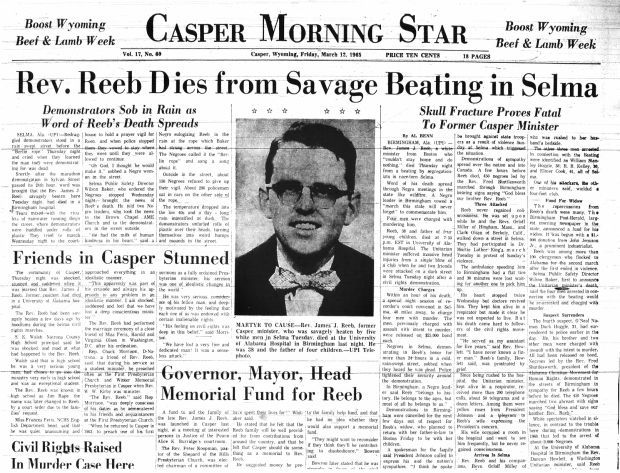
Documentary Short: http://www.nytimes.com/2015/03/06/opinion/a-call-from-selma.html?hp&action=click&pgtype=Homepage&module=c-column-top-span-region®ion=c-column-top-span-region&WT.nav=c-column-top-span-region&_r=0
James Reeb
Wikipedia
http://en.wikipedia.org/wiki/James_Reeb
James Reeb
Wikipedia
http://en.wikipedia.org/wiki/James_Reeb
When many of us think about the civil rights movement, we remember the courage of the black protesters who risked their lives and livelihoods to push for equal rights. But obscured in this history is the fact that it took the murder of a white clergyman to trigger the national outrage about rights abuses in the South that led to real change.
At the heart of this story is the death of the Rev. James Reeb, who was in Selma, Ala., for protests in March 1965. In this Op-Doc video, one of the other white clergymen with him, the Rev. Clark Olsen, tells how they were attacked by a group of white men, killing Mr. Reeb. The assault became national news.
Now retired in Asheville, N.C., Mr. Olsen says that publicly sharing these events helps him deal with his guilt that the country seemed to care more about the attack he experienced than the plight of Southern blacks at the time.
Mr. Olsen said he learned from an independent researcher that President Johnson received 57 phone calls expressing concern for Mr. Reeb’s ordeal (records confirm there were at least 50). In contrast, the murder of Jimmie Lee Jackson, a black man and the original inspiration for the march that became Bloody Sunday, received little national attention.
When Johnson gave his historic speech advocating for passage of the Voting Rights Bill, he invoked the death of the white minister, James Reeb, as opposed to the black man, Jimmie Lee Jackson. And with the support of a galvanized nation now behind it, the Voting Rights Bill was signed into law on Aug. 6, 1965.
In 1967, Dr. King noted, “The failure to mention Jimmy [sic] Jackson only reinforced the impression that to white Americans the life of a Negro is insignificant and meaningless.”
Fifty years after Bloody Sunday, these issues are as important as ever.
No comments:
Post a Comment